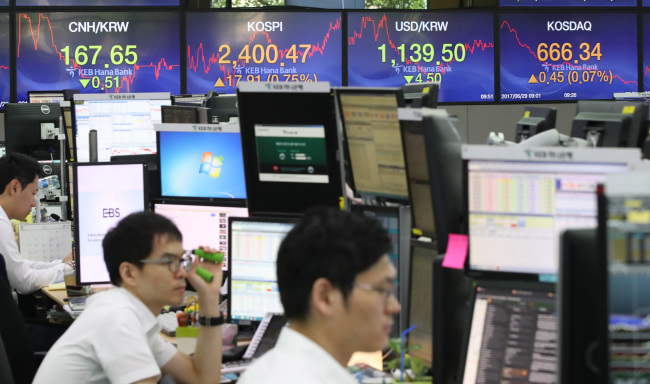Foreign investors' net purchase tops W10tr in 1st half
By Son Ji-hyoungPublished : July 2, 2017 - 16:18
Foreign investors’ net purchase of South Korean stocks are estimated to go beyond 10 trillion won ($8.7 billion) in the first half of 2017, the highest since 2009, data showed Sunday.
Their combined net purchase in the first-tier and second-tier stock markets reached 10.3 trillion won from January until Friday, according to data by Koscom, a market watcher launched by the Finance Ministry and the Korea Exchange.
Of the total 10.3 trillion won, offshore net purchase in the main bourse amounted to some 9.2 trillion won, accounting for nearly 90 percent. Foreign net purchase in the tech-heavy second-tier market came to 1.1 trillion won.
This marked the fourth time Korea‘s stock markets invited more than 10 trillion won of net investment in the first half of a year and the first since 2009 when it had reached 11.1 trillion won.
Their combined net purchase in the first-tier and second-tier stock markets reached 10.3 trillion won from January until Friday, according to data by Koscom, a market watcher launched by the Finance Ministry and the Korea Exchange.
Of the total 10.3 trillion won, offshore net purchase in the main bourse amounted to some 9.2 trillion won, accounting for nearly 90 percent. Foreign net purchase in the tech-heavy second-tier market came to 1.1 trillion won.
This marked the fourth time Korea‘s stock markets invited more than 10 trillion won of net investment in the first half of a year and the first since 2009 when it had reached 11.1 trillion won.

Shares of handset and panel maker LG Electronics drew the largest foreign investment in the first half, with the net purchase of foreign investors hitting 972 billion won. During the cited six months, LG Electronics soared 55.4 percent.
Following LG Electronics, KB Financial Group drew foreign net purchase of 722.4 billion won in the first half, throughout which its shares surged 34.8 percent.
Hyundai Motor, Samsung SDI and Hyundai Mobis were also among the top five companies that enjoyed the high net purchases of 690.9 billion won, 630.8 billion won and 530.8 billion won respectively.
In regards to net sales by foreigners, market bellwether Samsung Electronics’ ordinary shares and preference shares were ranked the highest, at 1.7 trillion won and 796.9 billion won. Chipmaker SK hynix, the second-largest in market capitalization in the main bourse, came at third with 376.8 billion won of foreigner net sales.
Meanwhile, institutional investors and individual investors showed net sales in the two markets worth 10.2 trillion won and 2.2 trillion won, respectively.
Potential for revaluation of local stocks, improved economic indicators such as export data and consumer price indexes, as well as uncertainties on the wane at home and abroad after President Moon Jae-in took office in May, have led to bull run that has continued for nearly two months, market watchers have noted.
Despite the benchmark Korea Composite Stock Price Index consistently touching untapped territories, Korean stocks “still have room for further growth.” wrote Gwak Hyun-soo, a strategist at Shinhan Financial Group, in a Friday note.
He cited indicators that Korean main stock market is undervalued. They include a comparatively low price earnings ratio at 9.9 percent, and the ratio of Kospi market capitalization to nominal gross domestic product standing at 92.4 percent, about 3 percent away from the historic ceiling. The lower the indicators are, the more undervalued a stock market is.
The Kospi topped 2,400 during Thursday trading for the first time. On May 22, it had closed at over 2,300, about a month after the index closed past 2,200 on April 26 for the first time in six years.
By Son Ji-hyoung (consnow@heraldcorp.com)
Following LG Electronics, KB Financial Group drew foreign net purchase of 722.4 billion won in the first half, throughout which its shares surged 34.8 percent.
Hyundai Motor, Samsung SDI and Hyundai Mobis were also among the top five companies that enjoyed the high net purchases of 690.9 billion won, 630.8 billion won and 530.8 billion won respectively.
In regards to net sales by foreigners, market bellwether Samsung Electronics’ ordinary shares and preference shares were ranked the highest, at 1.7 trillion won and 796.9 billion won. Chipmaker SK hynix, the second-largest in market capitalization in the main bourse, came at third with 376.8 billion won of foreigner net sales.
Meanwhile, institutional investors and individual investors showed net sales in the two markets worth 10.2 trillion won and 2.2 trillion won, respectively.
Potential for revaluation of local stocks, improved economic indicators such as export data and consumer price indexes, as well as uncertainties on the wane at home and abroad after President Moon Jae-in took office in May, have led to bull run that has continued for nearly two months, market watchers have noted.
Despite the benchmark Korea Composite Stock Price Index consistently touching untapped territories, Korean stocks “still have room for further growth.” wrote Gwak Hyun-soo, a strategist at Shinhan Financial Group, in a Friday note.
He cited indicators that Korean main stock market is undervalued. They include a comparatively low price earnings ratio at 9.9 percent, and the ratio of Kospi market capitalization to nominal gross domestic product standing at 92.4 percent, about 3 percent away from the historic ceiling. The lower the indicators are, the more undervalued a stock market is.
The Kospi topped 2,400 during Thursday trading for the first time. On May 22, it had closed at over 2,300, about a month after the index closed past 2,200 on April 26 for the first time in six years.
By Son Ji-hyoung (consnow@heraldcorp.com)



![[Exclusive] Korean military set to ban iPhones over 'security' concerns](http://res.heraldm.com/phpwas/restmb_idxmake.php?idx=644&simg=/content/image/2024/04/23/20240423050599_0.jpg&u=20240423183955)




![[Pressure points] Leggings in public: Fashion statement or social faux pas?](http://res.heraldm.com/phpwas/restmb_idxmake.php?idx=644&simg=/content/image/2024/04/23/20240423050669_0.jpg&u=)

![[Herald Interview] 'Amid aging population, Korea to invite more young professionals from overseas'](http://res.heraldm.com/phpwas/restmb_idxmake.php?idx=644&simg=/content/image/2024/04/24/20240424050844_0.jpg&u=20240424200058)









